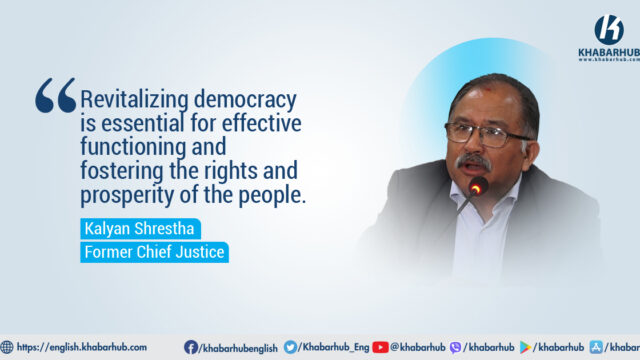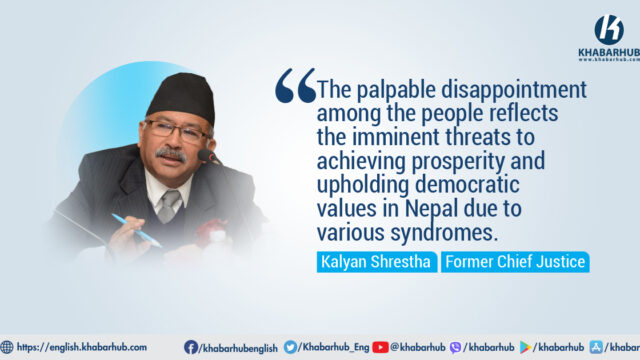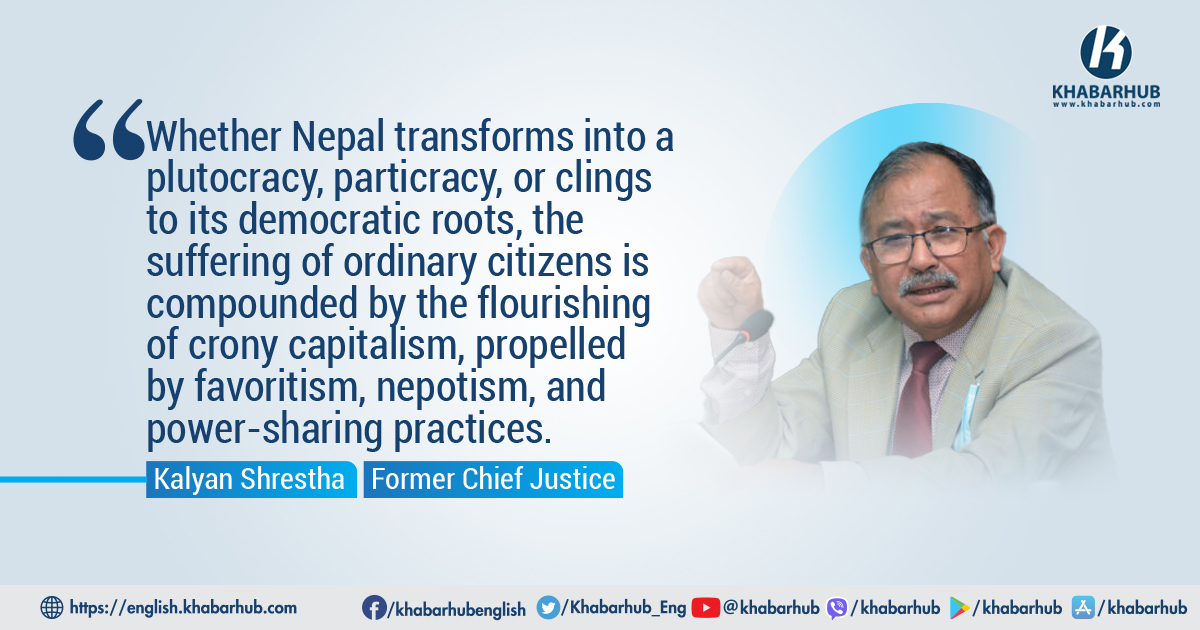In Nepal, a sense of foreboding despair casts its shadow across every sector, revealing a troubling neglect of effective problem-solving, fueling widespread frustration.
The economic, political, social, and constitutional realms, once sources of pride for Nepal, now falter in their endeavors to stimulate and enhance productivity.
This pervasive stagnation amplifies the common people’s growing mistrust of the government, leading to a noticeable surge in foreign employment and settlements abroad.
Whether Nepal transforms into a plutocracy, particracy, or clings to its democratic roots, the suffering of ordinary citizens is compounded by the flourishing of crony capitalism, propelled by favoritism, nepotism, and power-sharing practices.
These detrimental behaviors not only undermine the fabric of the nation across economic, political, social, and constitutional dimensions but also erode the bedrock of trust and confidence in governance.
The government’s revenue shortfall adds another layer of concern, falling short of the target by 1.5 trillion rupees in the first half of the current financial year.
The ascent of crony capitalism and the prevalence of favoritism and nepotism contribute to the deterioration of the overall law and order situation.
Simultaneously, the absence of inner-party democracy, coupled with a decline in the moral and ethical character of top leadership, proves detrimental to good governance.
The palpable disappointment among the people reflects the imminent threats to achieving prosperity and upholding democratic values in Nepal due to various syndromes.
To navigate these challenges and restore faith in the democratic process, urgent attention from the government and major political parties is needed to address the root causes.
A comprehensive effort to reinvigorate economic, political, and social systems with transparency, accountability, and a commitment to citizen welfare is indispensable.
Despite these troubling trends, Nepal aspires to overcome them and pave the way for a brighter, more prosperous democratic future.
Economically, a ‘ripple effect’ resonates across all sectors, with government debt doubling in the last five years alone and continuing to grow rapidly each year.
Nepal is grappling with a daunting public debt, which has surged to over Rs 23 trillion 84 crore, with internal debt constituting 50.5 percent and external debt making up the remaining 49.5 percent.
This mammoth public debt surpasses the annual government budget, highlighting a concerning financial predicament.
Despite official assurances of economic improvement, key indicators paint a contrasting picture.
Capital expenditure remains stagnant across all three levels of government, indicating minimal government spending.
The absence of a recall system for representatives fosters an erroneous perception of rulership rather than representation, contributing to a disconnect between elected officials and the electorate.
The private sector, a significant contributor, is showing limited activity, with only 80 percent of its potential being harnessed.

The government’s revenue shortfall adds another layer of concern, falling short of the target by 1.5 trillion rupees in the first half of the current financial year.
The Customs Department’s data underscores a worrisome trend, revealing a decline in exports, particularly in agriculture and industrial sectors.
Exports have dipped by 7.23 percent in the last six months, contributing to a substantial decrease in the demand for goods and services.
A more alarming development is the concentration of control in various sectors, including banks, industries, and insurance, within a limited class of financial syndicates.
This consolidation poses a significant challenge for new entrepreneurs, as banks shy away from providing support and investment, hindering economic sector growth.
On the other hand, the education sector is also grappling with challenges, with colleges struggling to attract students.
Even reputed private and technical colleges find themselves unable to enroll students.
A concerning trend emerges post-12th grade, where there is a proliferation of manpower companies masquerading as education consultancies due to foreign allure.
Adding to the predicament is a growing disillusionment among Nepalese citizens, prompting a rush to leave the country for educational or foreign employment opportunities.
The cumulative effect of these economic and social challenges demands urgent attention and comprehensive measures to revitalize Nepal’s economic landscape and restore confidence in its future.
Nepal faces a multifaceted challenge as skilled human resources, encompassing doctors and engineers, are increasingly leaving the country.
This brain drain has cascading effects on various sectors, including education, finance, and construction. Educational institutions, once esteemed, struggle to meet student quotas, and the profit of commercial banks has dipped by 10 percent in the initial half of the current financial year.
Criticism abounds that banks prioritize profits over supporting new entrepreneurs, leading to a stagnation in entrepreneurial growth.
Corporate houses, burdened by loans within specific groups, are teetering on the brink of collapse. Donor agencies’ reduced aid compounds the economic downturn, and vital industries like cement and steel operate at a mere 30 percent capacity, reflecting instability in the construction sector, which forms a substantial part of Nepal’s economy.
Constitutional economics and the socialist orientation ingrained in the national budget receive scant attention. Banking bad governance exacerbates the situation, especially evident in the cooperative sector, where microcredit practices and the debt trap contribute to economic woes.
With over 35,000 cooperative societies and millions of affiliated members, the government’s lack of attention to the challenges faced by depositors who have deposited over Rs 7 trillion is glaring.
Remittances, a cornerstone of Nepal’s economy, have reached a record high due to the increasing number of Nepalis working abroad.
However, the surge in foreign employment and permanent residency applications indicates a concerning trend of individuals opting not to return and contribute to the nation’s production.
The brain drain of skilled professionals, including doctors, nurses, and engineers, highlights a critical issue that demands deeper understanding. The growing resentment towards the country suggests a need for a thorough examination of the root causes behind individuals choosing not to stay in Nepal.
The ongoing dichotomy between politicians’ hegemony and the genuine concerns of the people is stark. To ensure the stability and effectiveness of democracy, a comprehensive evaluation of these factors is essential.
On a societal level, the challenges extend beyond economics. Democracy, it is emphasized, cannot be merely downloaded; it must be rooted in indigenous culture, realities, and contextualization.
While elections are a fundamental tool, the broader attributes of democracy, such as rights, participation, accountability, performance, oversight, and transparency, uniquely manifest in the specific context of a society.
The absence of a recall system for representatives fosters an erroneous perception of rulership rather than representation, contributing to a disconnect between elected officials and the electorate.
The stability of democracy is not merely a matter of the duration a regime survives; it is about how effectively it functions. Historically, tyrannical regimes have often outlasted true democracies in terms of longevity. The true measure lies in the sense of belongingness felt by the common people within the political system.
The key questions to assess this include whether the people feel they share the benefits of the system, have equal opportunities to participate in decision-making, experience a fair decision-making process, and find their quality of life significantly impacted by these decisions.
The ultimate test is the depth of their love for their own country, signifying the meaningfulness they attribute to their democracy.
Development and productivity are integral to cherishing democracy. The interdependence of democracy and development is emphasized, with the rule of law serving as the fabric binding the two.
Outdated laws, poor governance, and low development levels contribute to a sense of helplessness and hopelessness among citizens, jeopardizing the survival of democracy and the constitution, leading to a lack of peace, security, and justice.
The international standing of a nation is gauged by the attention it receives, its attractiveness, the aid and assistance it attracts, the respect it commands in global events, and the treatment of its passport holders during immigration processes.
Economic factors, such as borrowing, job opportunities for the labor force, and participation in the elite group of nations, also play a role.
Intellectual strengths are reflected in the development of science, art, and culture, and the international recognition of literature in other languages.
The constitution of a nation, in this case, emphasizes values such as republicanism, federalism, inclusion, the rule of law, and a socialist orientation in the economic system.
The crucial question is whether these values are enshrined in the constitution and if practical programs exist to transform them into reality.
The prevailing image of non-performance within the government highlights a focus on the duration of its tenure rather than showcasing tangible accomplishments.
The ongoing dichotomy between politicians’ hegemony and the genuine concerns of the people is stark. To ensure the stability and effectiveness of democracy, a comprehensive evaluation of these factors is essential.
The copycat nature evident in the constitution-drafting process has raised significant concerns regarding its implementation.
Questions are being raised about the transformation possibilities of the constitution, considering factors such as abilities, processes, infrastructures, institutions, political culture, resources, experiences, commitments, and binding values.
Verbal reiteration of the constitution’s precepts and values, without responsible behavior and practical supporting programs, challenges the credibility of the constitution.
The repeated promises of politicians without corresponding transformations contribute to public disillusionment and a lack of confidence in the existing political framework.
Leadership behavior is perceived as exploitative, leading to a sense of deception among the people. Despite expenditures on plans and programs, achievements are lacking, and poorly implemented or non-implemented programs add more inconvenience than benefits to stakeholders. Development costs escalate unreasonably, and incompetencies and malpractices go unrestrained.
The overall picture of constitution implementation for steering the ship of democracy is not optimistic. The crucial question arises: how long should the people wait or tolerate non-performance?
Impending dangers of mass frustration and disillusionment with the political system are on the horizon, urging a reevaluation of the democratic process.

This is not an argument against democracy but a call to explore and design ways to make democracy work and endure. The responsibility for such endeavors can be entrusted to the new generation and their aspirations for palpable change.
Democracy’s value lies not only in theoretical foundations but in practical implementation.
This exertion exacerbates the challenges, emphasizing the need for a reevaluation of governance priorities and a commitment to meaningful change.
The critical issue is not just what has not been achieved but the direction of change that democracy is expected to bring about.
The lack of demonstrated progress toward cherished goals raises concerns about the efficacy of current efforts.
Legally, when Parliament fails to introduce fundamental bills for an unreasonably long period, it not only hampers basic governance issues but also adversely affects federalization processes and development endeavors.
The need for a reevaluation of the democratic direction and a commitment to meaningful change becomes paramount.
The prevailing image of non-performance within the government highlights a focus on the duration of its tenure rather than showcasing tangible accomplishments.
This skewed priority perpetuates benefits for a select few, contributing to a perception of government complacency.
Real challenges in Nepal span a spectrum of governance issues, from the politicization of criminal activities to widespread impunity at both constitutional and administrative levels.
A decline in ethical values, irregularities, corruption, inefficiency, lack of accountability, and incompetence further compound the challenges.
The malfunctioning of constitutional bodies, mishandling of disputes, hegemonic transfers of civil service officers, and reluctance of civil servants to collaborate with subnational governments contribute to an array of concerns.
Beyond these issues, internal democracy is lacking within political parties, coupled with a lack of transparency in their financial management.
Efficient allocation and spending of funds for development pose challenges, leading to mismanagement of large projects, escalating costs, and extended timelines that hinder national development.
Political parties grapple with structural challenges within the judiciary, including problems with appointment mechanisms, politicization in judicial appointments, inefficiencies in complaint handling, consumer dissatisfaction, delays, irregularities, and financial constraints.
Constitutionally, fundamental rights face inadequate implementation, failing to bring meaningful changes to people’s daily experiences.
The absence of a specific program for investing in these rights, exemplified by the lack of an annual or periodic issuance of a white paper on their implementation, underscores a critical gap.
The misdirected implementation of federalization, coupled with a centralized federalism approach and a noncommittal attitude towards federalism by the federal government, presents another layer of challenges.
Provincial governments grapple with artificial challenges to their relevance within the federal structure, while local governments struggle to demonstrate competencies and fulfill responsibilities.
Addressing these challenges requires a holistic approach, emphasizing accountability, effective governance, and alignment with the evolving needs and expectations of the Nepalese populace.
The effective division of power in Nepal faces significant impediments due to a lack of coordination, coexistence, and collaboration among all three tiers of government.
This deficiency is further exacerbated by the federal government’s overreach, encroaching upon powers designated to state and local governments.
This imbalance raises serious concerns and underscores the necessity for a reevaluation of governance priorities, emphasizing the urgency for meaningful change.
The multifaceted challenges in constitutional justice within Nepal demand careful consideration.
Constitutional bodies are grappling with poor performance, leading to a legitimacy crisis.
Concurrently, concerns related to the electoral system, such as the absence of a single majority party, contribute to the formation of coalition governments marked by incessant bargaining instead of decisive governance.
Compounding these issues is the frequent targeting of the Parliament, facing attacks and unconstitutional dissolution without accountability for misconduct.
Ineffectual proceedings within the house result in substantial expenses with minimal outcomes, highlighting the pressing need for a more conducive environment for expediting legislative business.
Furthermore, Nepal’s political landscape has undergone numerous changes without sufficient attention to cultivating the essential characteristics necessary for effective operation within the evolving systems.
The consistent transition between political systems underscores the imperative to prioritize the development of essential character traits in current political figures.
Rigorous scrutiny of these figures is crucial for guiding the nation towards reformation and good governance.
Given the challenges in implementing the constitution, an urgent and comprehensive review becomes necessary.
Delays in this process could render the constitution irrelevant, as democracy extends beyond theoretical principles to practical applications and experiences.
To prevent public frustration from escalating, revisiting and reforming the constitution to align with evolving needs is paramount.
A looming leadership crisis in both political and administrative spheres is exacerbated by prolonged assurances and promises lacking sincerity, contributing to public dissatisfaction.
Revitalizing democracy is imperative for effective functioning and fostering the rights and prosperity of the people.
Addressing these challenges necessitates a holistic approach that emphasizes accountability, effective governance, and alignment with the evolving needs and expectations of the Nepalese populace.









Comment